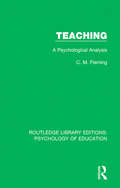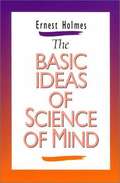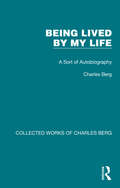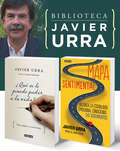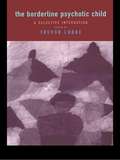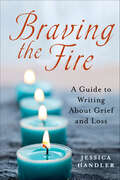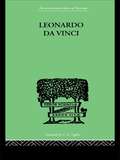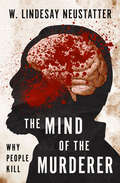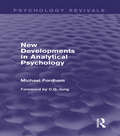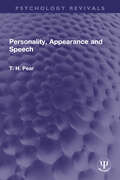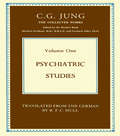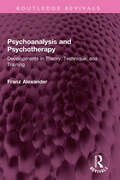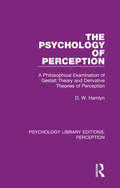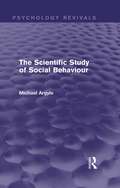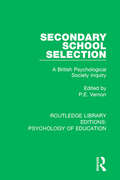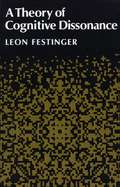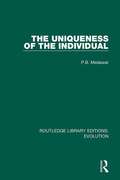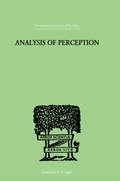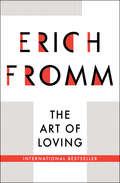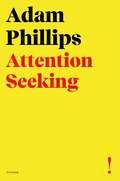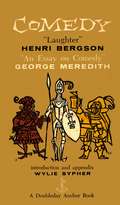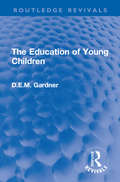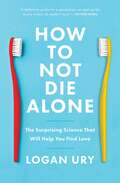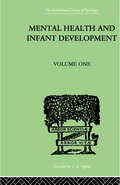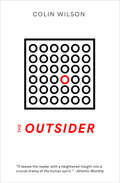- Table View
- List View
Teaching: A Psychological Analysis (Routledge Library Editions: Psychology of Education)
by C.M. FlemingOriginally published in 1968, the findings of modern psychological research had contributed much that was directly relevant to the problems of all who taught at the time. Dr Fleming here presents both recent and past conclusions in a survey that would have been useful to all who were called upon to give instruction. Since its first appearance in 1958 this book had been entirely revised and brought into line with the most modern research. Today it can be read and enjoyed in its historical context.
The Basic Ideas of Science of Mind
by Ernest HolmesA brief, straightforward and user-friendly account of the Science of Mind philosophy and teach, written in the last years of his life by the man who developed it.
Being Lived by My Life: A Sort of Autobiography (Collected Works of Charles Berg)
by Charles BergOriginally published in 1957, this book was a new departure in autobiographies. It is both enlightening and entertaining. There is a happy blending of narrative, reflection and occasional extracts from case histories which gives it a delightfully human character. But it is more than this. It is a story of the profound inward adventure of an exceptionally inquiring mind. From childhood to professional maturity it proceeds through economic difficulties, love and tribulation to science and general medical practice. It tells how Dr Berg became so convinced of the psychogenesis of human suffering that, with great courage, he gave up his practice and personal security to search for the causes in mental conflict. The story proceeds through specialisation in psychiatry to analytical training and analytic practice, building up in the later chapters to a description of the troubled mind in all its manifestations, and of the medical analyst’s daily work. There is a new explanation of the psychology of love with the inclusion of personal as well as professional experiences. Here, as throughout, conclusions have an astonishing difference from orthodox or familiar speculation, and this is because they are based strictly on knowledge, professional and personal. The style is natural, lively and lucid. Here is an opportunity to combine learning with entertainment for Dr Berg has an extraordinary flair for presenting difficult things attractively, without sacrifice of scientific essentials. This book is a re-issue originally published in 1957. The language used is a reflection of its era and no offence is meant by the Publishers to any reader by this re-publication.
Biblioteca Javier Urra (Pack 2 e-books): ¿Qué se le puede pedir a la vida? + Mapa sentimental
by Javier UrraJavier Urra, reconocido psicólogo desde hace muchos años, nos ofrece en estos dos libros su mejor filosofía para la vida. Este pack contiene: ¿Qué se le puede pedir a la vida? Una obra gratificante y reveladora que cuestiona nuestra capacidad para arriesgar y descubrir qué decisiones estamos dispuestos a tomar para conseguir lo que anhelamos todos: vivir con intensidad. Javier Urra nos ofrece en ¿Qué se le puede pedir a la vida? una serie de emotivas palabras, historias, leyendas, referencias, ideas, que son muestra de la vida vivida, de la vida buscada, y establece con el lector una conversación sincera y sencilla que apela directamente a la búsqueda de las fuerzas y de las razones para vivir, porque sólo disfrutaremos de nuestra existencia si somos capaces de contemplar el paso del tiempo como un regalo y de asumir los días como una oportunidad de reinventarnos y de sonreír. Mapa sentimental Nunca es tarde para el cambio, no hay acción sin conciencia ni conducta sin elección previa. Hemos de conocer nuestros sentimientos para entendernos y para comprender al otro... para ser felices. «Nuestra andadura emocional, sentimental se fundamenta en el simple hecho de sentir, de acumular pasiones. Ésta es nuestra verdadera naturaleza. Es importante avanzar en la vida con pilares sólidos fraguados desde la inteligencia, el humor, los sentimientos y la voluntad. Sólo si somos capaces de conocernos, de gestionar nuestros afectos, de aplacar nuestra ira y de vencer nuestros miedos podremos avanzar, cumplir nuestros objetivos.»Este libro nos propone diversos itinerarios para aprender a amar, a descubrir nuestras fortalezas, a atenuar nuestras debilidades... para conseguir alcanzar la estabilidad emocional».Javier Urra
The Borderline Psychotic Child: A Selective Integration
by Trevor LubbeThe Borderline Psychotic Child reviews the history and evolution of the borderline diagnosis for children, both in the USA and the UK, bringing the reader up to date with current clinical opinion on the subject. Using a range of clinical case studies, the book attempts to harmonise US and UK views on borderline diagnosis in the light of new developments in theory at The Menninger Clinic, The Anna Freud Centre and The Tavistock Clinic. Providing an introduction to the borderline concept, and a systematic overview of current theoretical thinking and clinical practices from leading practitioners in the field, The Borderline Psychotic Child will make informative reading both for professionals and students in the field of child analysis.
Braving the Fire: A Guide to Writing About Grief and Loss
by Jessica HandlerBraving the Fire is the first book to provide a road map for the journey of writing honestly about mourning, grief and loss. Created specifically by and for the writer who has experienced illness, loss, or the death of a loved one, Braving the Fire takes the writers' perspective in exploring the challenges and rewards for the writer who has chosen, with courage and candor, to be the memory keeper. It will be useful to the memoirist just starting out, as well as those already in the throes of coming to terms with complicated emotions and the challenges of shaping a compelling, coherent true story.Loosely organized around the familiar Kübler-Ross model of Five Stages of Grief, Braving the Fire uses these stages to help the reader and writer though the emotional healing and writing tasks before them, incorporating interviews and excerpts from other treasured writers who've done the same. Insightful contributions from Nick Flynn, Darin Strauss, Kathryn Rhett, Natasha Trethewey, and Neil White, among others, are skillfully bended with Handler's own approaches to facing grief a second time to be able to write about it. Each section also includes advice and wisdom from leading doctors and therapists about the physical experience of grieving. Handler is a compassionate guide who has braved the fire herself, and delivers practical and inspirational direction throughout.
Leonardo da Vinci: A Memory of His Childhood (Barnes And Noble Library Of Essential Reading Ser. #0)
by Sigmund FreudA reconstruction of Leonardo's emotional life from his earliest years, it represents Freud's first sustained venture into biography from a psychoanalytic perspective, and also his effort to trace one route that homosexual development can take.
The Mind of the Murderer: Why People Kill
by W. Lindesay NeustatterThis study by a British psychologist explores the relationship between mental illness, murder, and the Homicide Act of 1957.In 1957, a new bill went before Parliament addressing the use of capital punishment in cases of murder. It sparked a debate—as relevant today as it was then—about how to prosecute a killer who suffers a mental illness or disability. In order to shed light on the terms of this argument, psychologist W. L. Neustatter published this study of recent homicide cases that touched on the subject. Here, Neustatter examines the minds of murderers known to be schizophrenic or psychopathic, or suffer from such conditions as epilepsy or paranoia. He also looks at a case of murder under hypnosis; a man who made, then retracted, his guilty confession; and a variety of other cases that fall into a troubling grey area of culpability.
New Developments in Analytical Psychology (Psychology Revivals)
by Michael FordhamOriginally published in 1957, New Developments in Analytical Psychology built on the work of C.G. Jung. Jung’s researches into the unconscious had led him to study the history of religion and the hitherto little understood psychology of alchemy; they had directed him away from child psychology and also, in later years, away from clinical analysis as well. Nonetheless his discoveries and theories have essential relevance in both these spheres. All the papers in this volume complement and amplify Jung’s work. The author made a special study of child analysis and ego development and here publishes his conclusions in a series of papers. The studies of children led to developments in analytic techniques which are worked out in a longer essay on the transference, to the understanding of which analytical psychology has a unique contribution; they have also stimulated a reassessment of the relation between the concept of archetypes and modern theories of heredity, instinct, neuro-physiology, and evolution, in which there had been much misunderstanding at the time. Michael Fordham was the last of the founders of a movement in psychoanalysis, and pioneered the Jungian analysis of children. This significant, early work can now be read and enjoyed in its historical context.
Personality, Appearance and Speech (Routledge Revivals)
by T. H. PearFirst published in 1957, Personality. Appearance and Speech is an intensive analysis of personality reflected by appearance and speech. It is a most fascinating study of the innumerable outward signs by which the man in the street judges personality. The author considers the effects this has on daily life; for example, can a person’s real character be assessed by a short interview in which personality, counting for so much, can be altered deliberately to no little extent? He describes many investigations which have attempted to discover experimentally the nature and accuracy of personality and character assessments, and includes personality sketches of F. D. Roosevelt, W. E. Gladstone, and of other prominent figures. He discusses the social results of the microphone and the effect on good and bad taste, of opinions widely expressed by listeners and viewers. The nature and function of the intellectuals who have increasing opportunities of affecting appearance and speech, are examined from the psychologist’s standpoint. This book will be of interest to students of psychology, sociology and social behaviour.
Psychiatric Studies: Experiments In The Diagnosis Of Psychopathological Conditions Carried Out At The Psychiatric Clinic Of The University Of Zurich (classic Reprint) (Collected Works of C.G. Jung #No. 20)
by C.G. JungAt the turn of the last century C.G. Jung began his career as a psychiatrist. During the next decade, three men whose names are famous in the annals of medical psychology influenced his professional development: Pierre Janet, under whom he studied at the Sappetriere Hospital in Paris; Eugen Bleuler, his chief at the Burgholzli Mental Hospital in Zurick; and Sigmund Frued, whom Jung met in 1907. It is Bleuler, and to a lesser extent Janet, whose influence is to be found in the descriptive experimental psychiatry composing Volume I of the Collected Works. These papers appeared between 1902 and 1905l most of them are now being published in English for the first time. The volume opens with Jung's dissertation for the medical degree: 'On the Psychology and Pathology of So-Called Occult Phenomena', a study that foreshadows much of his later work, and as such is indispensable to all serious students of his work. It is the detailed analysis of the case of an hysterical adolescent girl who professed to be a medium. The volume also includes papers on cryptomnesia, hysterical parapraxes in reading, manic mood disorder, simulated insanity, and other subjects.
Psychoanalysis and Psychotherapy: Developments in Theory, Technique, and Training (Psychology Revivals)
by Franz AlexanderFirst published in 1957 Psychoanalysis and Psychotherapy summarizes and evaluates the trends in this field in the 1950s. By 1950s important changes have taken place as a result of growing acceptance of psychoanalysis by the medical community. More and more we realize the great possibilities of applying the knowledge gained from psychoanalysis to psychotherapy. What is called ‘dynamically oriented psychotherapy’ with its less complete and less intensive treatment can greatly benefit large group of patients. Dr Alexander illuminates interesting points of theory, discusses controversial issues, and offers views- his own and those of others- on questions of psychiatric training both in psychoanalytic institutes and in medical schools. This comprehensive book is a must read for everyone concerned with the urgent problem of mental health.
The Psychology of Perception: A Philosophical Examination of Gestalt Theory and Derivative Theories of Perception (Psychology Library Editions: Perception #13)
by D. W. HamlynOriginally published in 1957, the primary aim of this study was to shed light upon the logical character of the psychology of perception. D.W. Hamlyn begins by delimiting the field of psychological inquiry into perception, then gives a detailed account of the types of explanation appropriate in the field. He maintains that these explanations have certain important peculiarities which distinguish them from other scientific inquiries. In view of the central importance of Gestalt Theory in this field an account is given of its origins, and its main features are critically discussed. The work should still be of considerable interest to both philosophers and psychologists, as well as to all those interested in the relations between the two subjects.
The Scientific Study of Social Behaviour (Psychology Revivals)
by Michael ArgyleOriginally published in 1957, this book presented an up-to-date account of psychological research into human social behaviour of the time. There are chapters on interaction between pairs of people, behaviour in small social groups, and human relations in industry. The author avoided the adoption of any particular theoretical position, and concentrated on the established empirical findings of the time. The results of several hundred investigations are summarised and compared, so that the principal generalisations which emerge can be seen. Stress is placed on rigorous methods of research, and a critical account is given of current techniques of social research, showing the importance of experimental and statistical methods. Careful consideration is given to the danger of the investigator disturbing what is being investigated. Use is made of recent ideas about theory and explanation, and the different kinds of theory used in experimental psychology were considered for the first time as possible ways of accounting for group behaviour. This book was intended not only for students of psychology and of the other social sciences, but also for industrialists, administrators and indeed all who were interested in the laws underlying social behaviour. Today it can be read and enjoyed in its historical context.
Secondary School Selection: A British Psychological Society Inquiry (Routledge Library Editions: Psychology of Education)
by P. E. VernonSelection for secondary education at 11-plus still arouses widespread controversy; and the psychological techniques which are employed, such as intelligence and attainments tests, are often criticised. Originally published in 1957, under the auspices of the British Psychological Society, a group of psychologists, experienced in this field, tried to present a balanced survey of the situation at the time. They show that the real problems of secondary schooling cannot be solved by simple administrative changes; they arise from historical causes, from the class structure of English society and the educational and vocational ambitions of parents. Psychology has studied the development and differentiation of children’s abilities and interests with age, and thus throws light on the need for, and the consequences of, streaming children in different classes or schools, and the value of alternative systems such as the comprehensive school. Selection at 11-plus, it is admitted, does have harmful effects on teaching in the junior school and produces much emotional strain, though these effects are often exaggerated. It was, in fact, accurate for some ninety per cent of children; yet the implications of its inevitable inaccuracy for some pupils cannot be ignored. The functions, and the value, of intelligence and attainments tests and the essay are examined, and full consideration given to the use of teachers’ estimates of suitability and other techniques. The Report is addressed primarily to teachers, educational administrator, and psychologists – that is people with some background knowledge of the problems involved; but it should also be intelligible and helpful to the educated layman, since the more technical details are confined to Appendices.
A Theory Of Cognitive Dissonance
by Leon FestingerLeon Festinger's theory of cognitive dissonance has been widely recognized for its important and influential concepts in areas of motivation and social psychology. The theory of dissonance is here applied to the problem of why partial reward, delay of reward , and effort expenditure during training result in increased resistance to extinction. The author contends that a state of impasse exists within learning theory largely because some of its major assumptions stand in apparent opposition to cetain well-established experimental results. The book puts forward a new theory that seems to reconcile these data and assumptions. This new theory can account for data with which other theories have difficulty: it integrates empirical phenomena that have been regarded as unrelated, and it is supported by the results of experiments designed specifically to test its implications. These experiments are fully described in the text.
The Uniqueness of the Individual (Routledge Library Editions: Evolution #8)
by P.B. MedawarOriginally published in 1957, The Uniqueness of the Individual is a collection of 9 essays published from the ten years preceding publication. The essays deal with some of the central problems of biology. These are among the questions put and answered from the standpoint of modern experimental biology. What is ageing and how is it measured? What theories have been held to account for it, and with what success? Did ageing evolve, and if so how? Is Lamarckism and adequate explanation of evolutionary process? Does evolution sometimes go wrong? Do human beings evolve in a way peculiar to themselves? Other essays touch upon the problems of scientific method and of growth and transformation. This book will be of interest to natural historians, evolutionists and anthropologists.
Analysis Of Perception (International Library Of Psychology Ser.)
by Smythies, J RFirst published in 1999. Routledge is an imprint of Taylor & Francis, an informa company.
The Art of Loving (Classics Of Personal Development Ser.)
by Erich FrommThe international bestseller that launched a movement with its powerful insight: "Love is the only sane and satisfactory answer to the problem of human existence."The Art of Loving is a rich and detailed guide to love--an achievement reached through maturity, practice, concentration, and courage. In the decades since the book's release, its words and lessons continue to resonate. Erich Fromm, a celebrated psychoanalyst and social psychologist, clearly and sincerely encourages the development of our capacity for and understanding of love in all of its facets. He discusses the familiar yet misunderstood romantic love, the all-encompassing brotherly love, spiritual love, and many more. A challenge to traditional Western notions of love, The Art of Loving is a modern classic about taking care of ourselves through relationships with others. This ebook features an illustrated biography of Erich Fromm including rare images and never-before-seen documents from the author's estate.
Attention Seeking
by Adam PhillipsAttention Seeking is a short, fascinating introduction to the concept of attention from Britain’s leading psychoanalyst, author of Missing Out and On Kindness.Everything depends on what, if anything, we find interesting: on what we are encouraged and educated to find interesting, and what we find ourselves being interested in despite ourselves. There is our official curiosity and our unofficial curiosity (and psychoanalysis is a story about the relationship between the two).Based on three connected lectures by Adam Phillips, this compact book is a lucid and memorable introduction to the concept of our attention, spanning from interest to obsession, private desire to corporate commodity. What is attention, and why do we seek it? How does our culture moralize attention as a force in need of control? Phillips is one of our brightest and most unusual thinkers, uniquely capable of bringing our deepest impulses and instincts to light.
Comedy: An Essay on Comedy
by George Meredith Henri Bergson Wylie SypherWhen she has frolicked through her five Acts to surprise you with the information that Mr. Aimwell is converted by a sudden death in the world outside the scenes into Lord Aimwell, and can marry the lady in the light of day, it is to the credit of her vivacious nature that she does not anticipate your calling her Farce.
The Education of Young Children (Routledge Revivals)
by D.E.M. GardnerFirst published in 1956, The Education of Young Children is focused on presenting the psychological needs of children within education, following several talks given by the author at conferences for teachers of young children. The book highlights the importance of meeting all aspects of a child’s needs. It demonstrates that physical, emotional, social, and intellectual needs are all intrinsically connected and fundamental to education and development. It also puts forward the significance of Nursery Schools and the training given to Nursery School teachers, as well as the influence of Nursery Schools on Infant Schools. The Education of Young Children will appeal to those with an interest in the history and psychology of education.
How to Not Die Alone: The Surprising Science That Will Help You Find Love
by Logan UryA &“must-read&” (The Washington Post) funny and practical guide to help you find, build, and keep the relationship of your dreams.Have you ever looked around and wondered, &“Why has everyone found love except me?&” You&’re not the only one. Great relationships don&’t just appear in our lives—they&’re the culmination of a series of decisions, including whom to date, how to end it with the wrong person, and when to commit to the right one. But our brains often get in the way. We make poor decisions, which thwart us on our quest to find lasting love. Drawing from years of research, behavioral scientist turned dating coach Logan Ury reveals the hidden forces that cause those mistakes. But awareness on its own doesn&’t lead to results. You have to actually change your behavior. Ury shows you how. This &“simple-to-use guide&” (Lori Gottlieb, New York Times bestselling author of Maybe You Should Talk to Someone) focuses on a different decision in each chapter, incorporating insights from behavioral science, original research, and real-life stories. You&’ll learn: -What&’s holding you back in dating (and how to break the pattern) -What really matters in a long-term partner (and what really doesn&’t) -How to overcome the perils of online dating (and make the apps work for you) -How to meet more people in real life (while doing activities you love) -How to make dates fun again (so they stop feeling like job interviews) -Why &“the spark&” is a myth (but you&’ll find love anyway) This &“data-driven&” (Time), step-by-step guide to relationships, complete with hands-on exercises, is designed to transform your life. How to Not Die Alone will help you find, build, and keep the relationship of your dreams.
Mental Health And Infant Development: Volume One: Papers and Discussions
by Kenneth SoddyThis is Volume XXVII of thirty-two of a series on Developmental Psychology. Originally published in 1956, this is part one(papers and discussions) of two on mental health and infant development, and is the proceedings of the International Seminar held by the World Federation of Mental Health at Chichester, England.
The Outsider: A Study Of Sexual Outsiders (Picador Bks. #Vol. 6)
by Colin WilsonAs relevant today as when it originally published, THE OUTSIDER explores the mindset of characters who exist on the margins, and the artists who take them there. Published to immense acclaim, THE OUTSIDER helped to make popular the literary concept of existentialism. Authors like Sartre, Kafka, Hemingway, and Dostoyevsky, as well as artists like Van Gogh and Nijinsky delved for a deeper understanding of the human condition in their work, and Colin Wilson’s landmark book encapsulated a character found time and time again: the outsider. How does he influence society? And how does society influence him? It’s a question as relevant to today’s iconic characters (from Don Draper to Voldemort) as it was when initially published. Wilson’s seminal work is a must-have for those who love books and are fascinated by that most difficult to understand of characters.
